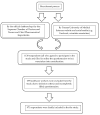Safety Profile of COVID-19 Vaccines among Healthcare Workers in Poland
- PMID: 35335066
- PMCID: PMC8949184
- DOI: 10.3390/vaccines10030434
Safety Profile of COVID-19 Vaccines among Healthcare Workers in Poland
Abstract
The aim of the study was to compare the safety profiles (prevalence of both local and systemic side effects) of COVID-19 vaccines (Pfizer−BioNTech, Moderna, Oxford−AstraZeneca) among healthcare workers (doctors, nurses, and pharmacists) administered with a first and a second dose of the vaccines. Another goal of the research was to evaluate potential demographic and clinical risk factors for the frequency and intensity of side effects. A post-marketing, cross-sectional survey-based study was carried out on a sample of 971 respondents (323 doctors, 324 nurses, and 324 pharmacists), all more than 18 years old, who have taken two doses of the following SARS-CoV-2 vaccines: BNT162b2 (Pfizer−BioNTech) (group 1), mRNA-1273 (Moderna) (group 2), and ChAdOx1 nCoV-19 (Oxford−AstraZeneca) (group 3). A validated, self-administered questionnaire was developed and delivered online to the target population group of healthcare workers. The survey was conducted during the third wave of the COVID-19 (1 February 2021−1 July 2021) pandemic. It was based on the CAWI (computer-assisted web interview) method. Questionnaires were disseminated using selected social media. The BNT162b2 (Pfizer−BioNTech) vaccine was the most commonly administered COVID-19 vaccine among healthcare professionals in Poland (69.61%). Side effects following a SARS-CoV-2 vaccine were reported by 53.11% of respondents in group 1, 72% in group 2, and 67.59% in group 3. The following were the most common side effects regardless of the type of vaccine administered: pain at the injection site, headache, muscle pain, fever, chills, and fatigue. The number and intensity of reported side effects following administration of a BNT162b2 (Pfizer−BioNTech) vaccine were significantly lower than in the other two study groups (p < 0.00001). Risk factors for side effects following administration of one of the SARS-CoV-2 vaccines subject to the analysis included being female, young, and suffering from a diagnosed allergy. Our results clearly show that the short-term safety profiles of the eligible COVID-19 vaccines (Pfizer−BioNTech, Moderna, Oxford−AstraZeneca) are acceptable. Nevertheless, the two-dose COVID-19 vaccines available in Poland differ significantly in the frequency of both local and systemic side effects and their intensity. Women, young people, and patients diagnosed with allergies are particularly exposed to the risk of side effects. Further studies are needed to determine the long-term safety profile of COVID-19 vaccines.
Keywords: COVID-19; Moderna (mRNA-1273) vaccines; Oxford–AstraZeneca (ChAdOx1 nCoV-19) vaccines; Pfizer–BioNTech (BNT162b2) vaccines; SARS-CoV-2; pharmacovigilance.
Conflict of interest statement
The authors declare no conflict of interest.
Figures
Similar articles
-
Adverse Effects of Pfizer (BioNTech), Oxford-AstraZeneca (ChAdOx1 CoV-19), and Moderna COVID-19 Vaccines among the Adult Population in Saudi Arabia: A Cross-Sectional Study.Vaccines (Basel). 2023 Jan 20;11(2):231. doi: 10.3390/vaccines11020231. Vaccines (Basel). 2023. PMID: 36851109 Free PMC article.
-
Side effects associated with homogenous and heterogenous doses of Oxford-AstraZeneca vaccine among adults in Bangladesh: an observational study.Sci Rep. 2024 Oct 11;14(1):23794. doi: 10.1038/s41598-024-75833-z. Sci Rep. 2024. PMID: 39394252 Free PMC article.
-
Surveillance of Post-Vaccination Side Effects of COVID-19 Vaccines among Saudi Population: A Real-World Estimation of Safety Profile.Vaccines (Basel). 2022 Jun 10;10(6):924. doi: 10.3390/vaccines10060924. Vaccines (Basel). 2022. PMID: 35746532 Free PMC article.
-
COVID-19 vaccines: comparison of biological, pharmacological characteristics and adverse effects of Pfizer/BioNTech and Moderna Vaccines.Eur Rev Med Pharmacol Sci. 2021 Feb;25(3):1663-1669. doi: 10.26355/eurrev_202102_24877. Eur Rev Med Pharmacol Sci. 2021. PMID: 33629336 Review.
-
Anti-Coronavirus Vaccines: Past Investigations on SARS-CoV-1 and MERS-CoV, the Approved Vaccines from BioNTech/Pfizer, Moderna, Oxford/AstraZeneca and others under Development Against SARSCoV- 2 Infection.Curr Med Chem. 2022;29(1):4-18. doi: 10.2174/0929867328666210521164809. Curr Med Chem. 2022. PMID: 34355678 Review.
Cited by
-
COVID-19 vaccine short-term adverse events in the real-life family practice in Krakow, Poland.Eur J Gen Pract. 2023 Dec;29(2):2147500. doi: 10.1080/13814788.2022.2147500. Epub 2022 Dec 5. Eur J Gen Pract. 2023. PMID: 36469611 Free PMC article.
-
Association between Compliance with COVID-19 Restrictions and the Risk of SARS-CoV-2 Infection in Poland.Healthcare (Basel). 2023 Mar 22;11(6):914. doi: 10.3390/healthcare11060914. Healthcare (Basel). 2023. PMID: 36981571 Free PMC article.
-
The Incidence Proportion of SARS-CoV-2 Infections and the Percentage of Deaths among Infected Healthcare Workers in Poland.J Clin Med. 2023 May 27;12(11):3714. doi: 10.3390/jcm12113714. J Clin Med. 2023. PMID: 37297910 Free PMC article.
-
The Application of mRNA Technology for Vaccine Production-Current State of Knowledge.Vaccines (Basel). 2025 Apr 4;13(4):389. doi: 10.3390/vaccines13040389. Vaccines (Basel). 2025. PMID: 40333251 Free PMC article. Review.
-
The Prevalence and Correlates of Anxiety, Stress, Mood Disorders, and Sleep Disturbances in Poland after the Outbreak of the Russian-Ukrainian War 2022.Healthcare (Basel). 2024 Sep 14;12(18):1848. doi: 10.3390/healthcare12181848. Healthcare (Basel). 2024. PMID: 39337189 Free PMC article.
References
-
- World Health Organization WHO Coronavirus Disease (COVID-19) Dashboard. 2022. [(accessed on 15 January 2022)]. Available online: https://covid19.who.int.
-
- Sacharczuk W., Dankowski R., Marciniak A., Szałek-Goralewska A., Szyszka A. Cardiovascular Imaging in the Acute Phase of Coronavirus Disease 2019 (COVID-19) J. Med. Sci. 2021;90:e532. doi: 10.20883/medical.e532. - DOI
-
- Seostianin M., Neumann-Podczaska A., Wieczorowska-Tobis K. Towards effective collaboration of physicians and pharmacists for the care of older people (including COVID-19 perspective) J. Med. Sci. 2020;89:e424. doi: 10.20883/medical.e424. - DOI
LinkOut - more resources
Full Text Sources
Miscellaneous


